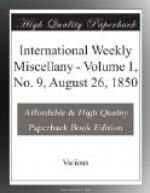Thou movest side by side with Jove,
And, ’tis a quaint conceit,
perchance—
Thou seem’st in humid light to move
As tears concealed thy burning
glance—
Such Virgil saw thee, when thine eyes,
More lovely through their
glow,[2]
Won from the Thunderer of the skies
An accent soft and low.
And Mars is there with his red beams,
Tumultuous, earnest, unsubdued—
And silver-footed Dian gleams
Faint as when she, on Latmos
stood—
God help the child! such night brought
forth
When Love to Power appeals,
And strong-willed Mars at frozen north
Beside Diana steals.
Brooklyn, August, 1850.
[Footnote 2: “Lachrymis oculos effusa nitentes.”]
* * * * *
Friendship.
How oft the burdened heart would sink
In fathomless despair
But for an angel on the brink—
In mercy standing there:
An angel bright with heavenly light—
And born of loftiest skies,
Who shows her face to mortal race,
In Friendship’s holy
guise.
Upon the brink of dark despair,
With smiling face she stands;
And to the victim shrinking there,
Outspreads her eager hands:
In accents low that sweetly flow
To his awakening ear,
She woos him back—his deathward
track.
Toward Hope’s effulgent
sphere.
Sweet Friendship! let me daily give
Thanks to my God for thee!
Without thy smiles t’were death
to live,
And joy to cease to be:
Oh, bitterest drop in woe’s full
cup—
To have no friend in need!
To struggle on, with grief alone—
Were agony indeed!
August. William C. Richards.
* * * * *
The balance of life.
All daring sympathy—clear-sighted
love—
Is, from its source, a ray
of endless bliss;
Self has no place in the pure world above,
Its shadows vanish in the
strife of this.
The toil—the tumult—the
sharp struggle o’er,—
The casket breaks;—men
say, “A martyr dies!”
The death—the martyrdom—has
past before:
The soul, transfigured, finds
its native skies.
The good—the ill—we
vainly strive to weigh
With Reason’s scales,
hung in the mists of Time:
Yet child-like Faith the balance doth
survey,
Held high in ether, by a hand
sublime.
May, 1850. Herma.
* * * * *
SCIENCE.
* * * * *




